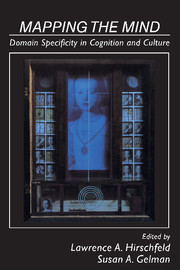Book contents
- Frontmatter
- Contents
- List of contributors
- Preface
- Part I Overview
- Part II The origins of domain knowledge: Biology and evolution
- Part III The origins of domain knowledge: Conceptual approaches
- Part IV Are domains theories?
- 10 The theory theory
- 11 Thinking by children and scientists: False analogies and neglected similarities
- 12 Core domains versus scientific theories: Evidence from systematics and Itza-Maya folkbiology
- 13 Essentialist beliefs in children: The acquisition of concepts and theories
- Part V Domains across cultures and languages
- Part VI Implications for education
- Author index
- Subject index
11 - Thinking by children and scientists: False analogies and neglected similarities
Published online by Cambridge University Press: 04 August 2010
- Frontmatter
- Contents
- List of contributors
- Preface
- Part I Overview
- Part II The origins of domain knowledge: Biology and evolution
- Part III The origins of domain knowledge: Conceptual approaches
- Part IV Are domains theories?
- 10 The theory theory
- 11 Thinking by children and scientists: False analogies and neglected similarities
- 12 Core domains versus scientific theories: Evidence from systematics and Itza-Maya folkbiology
- 13 Essentialist beliefs in children: The acquisition of concepts and theories
- Part V Domains across cultures and languages
- Part VI Implications for education
- Author index
- Subject index
Summary
In this chapter, I distinguish among three types of cognitive activity: the cognitive processes of children; the cognitive processes of individual scientists; and the collective, public enterprise that constitutes the history of science. I propose that when we focus on individual scientists rather than the organized discipline within which they work, there are some neglected similarities between the way that they think and the way that young children think. On the other hand, I argue against the proposal that there are important and interesting analogies between the cognitive processes of children and the collective history of science. In particular, I argue against the claim that individual children show patterns of cognitive development in early childhood that resemble the shifts in theoretical stance that are found in scientific disciplines viewed across several decades or centuries.
On general grounds, this analogy is implausible. First, science as a progressive enterprise is a highly specialized activity involving few individuals even in this century and virtually none throughout most of human history. By contrast, many facets of cognitive development in children are universal, and probably have been throughout most of our history. Second, theory change in science is a collective activity that depends on competitive, interindividual and intergroup communication. Yet, cognitive development in individual children is not in any obvious sense a collective or competitive enterprise.
The standard basis for the alleged analogy is that science exhibits four important cognitive traits: theoretical economy, corrigibility, domain specificity, and an absence of magical thinking. First, a large set of observations is explained – economically – in terms of a small set of theoretical postulates or principles.
- Type
- Chapter
- Information
- Mapping the MindDomain Specificity in Cognition and Culture, pp. 294 - 315Publisher: Cambridge University PressPrint publication year: 1994
- 15
- Cited by



